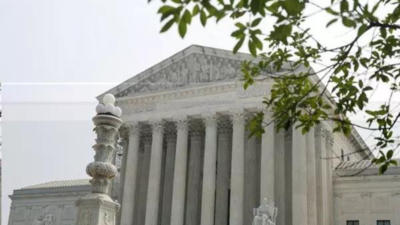[ad_1]

The US Supreme Court (SC) has held that the Department of Homeland Security (DHS) retains broad discretionary power to revoke approved visa petitions, even when such revocations are based on allegations of fraud or sham marriages. In a unanimous decision written by Justice Ketanji Brown Jackson, the SC affirmed that federal courts lack jurisdiction to review these discretionary decisions under immigration law.
The case, Bouarfa v. Mayorkas, centered on a visa petition filed by US citizen Amina Bouarfa for her noncitizen spouse, Ala’a Hamayel. Initially approved by US Citizenship and Immigration Services (USCIS), the petition was later revoked after DHS claimed evidence suggested that Hamayel had previously entered into a fraudulent marriage to obtain immigration benefits.
Bouarfa challenged the revocation, asserting that it was arbitrary and capricious, but the Court upheld the agency’s discretion under 8 U.S.C. §1155. This statute allows DHS to revoke visa petitions ‘at any time’ for what it deems ‘good and sufficient cause.’
Key Takeaways from the Ruling:
- Broad discretion: The SC held that §1155 grants DHS wide latitude in determining when to revoke visa petitions. Congress intentionally refrained from imposing conditions or limitations on this authority, signaling deference to agency discretion.
- Judicial review barred: The SC concluded that under §1252(a)(2)(B)(ii), decisions deemed discretionary by legislation are insulated from judicial review. This includes revocations like those in Bouarfa’s case.
Justice Jackson wrote, “The statutory framework demonstrates Congress’s intent to preclude judicial interference in such discretionary decisions, even when significant life consequences are at stake.”
Implications of the decision:
The order underscores the finality of agency discretion in immigration matters, reinforcing DHS’s authority to revoke visa petitions without court oversight. Critics argue that this could leave petitioners vulnerable to administrative errors or overreach. Proponents, however, see it as a necessary safeguard against fraud in a complex immigration system.
Views of immigration experts:
According to Charles Kuck, immigration attorney, “The issue really is the ability of agencies to operate without court oversight. This is a very dangerous situation for immigrants and give immense power to the executive branch to revoke legitimate applications for any “good and sufficient cause” without any review. Bad actors, like President Trump, can use this to disadvantage legal immigrants.”
Cyrus D. Mehta, immigration attorney, told TOI, “This SC decision affirmed that federal courts have no jurisdiction in reviewing the revocation of an immigrant visa petition. Section 205 of the Immigration and Nationality Act authorizes the Secretary of Homeland Security to revoke the approval of an immigrant visa petition for good and sufficient cause. Once the DHS revokes the petition, a court cannot review the revocation as it is a discretionary action. Under INA 242(a)(2)(B) federal courts have been stripped of jurisdiction to review discretionary relief or actions. Revocation of a visa petition is a discretionary decision, according to Bouarfa v. Mayorkas, which is thus unreviewable by a federal court.”
Metha illustrates:
Illustration 1:
If an employer files an I-140 petition on behalf of its noncitizen skilled worker employee and it gets approved, and the DHS revokes the I-140 if it finds that the underlying labor certification was obtained fraudulently, the employer cannot ask a federal court to review the revocation.
Form I-140 is filed to petition for a noncitizen worker to become a lawful permanent resident, it is a crucial step in the green card process.
Illustration 2:
A US citizen files an I-130 petition (to establish the existence of a relationship) on behalf of a noncitizen spouse and it gets approved. The DHS can later on revoke the petition if it finds that the marriage was a sham marriage. The US citizen can challenge the revocation administratively if he/she believes that the marriage was genuine, but if it is still denied administratively, the citizen cannot seek review in federal court of the revocation of the petition, according to Bouarfa v. Mayorkas.
That said, the US Supreme Court’s decision also highlighted the practical recourse available to petitioners: filing a new visa petition or challenging future DHS determinations if circumstances change. Bouarfa has reportedly filed a second visa petition for her spouse, which remains under review.
[ad_2]
Source link


